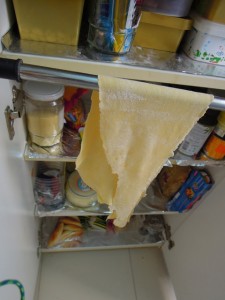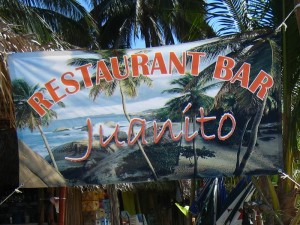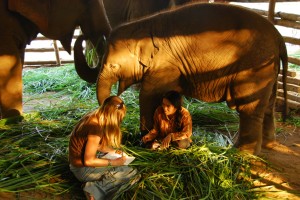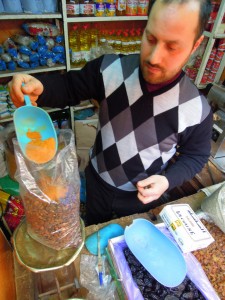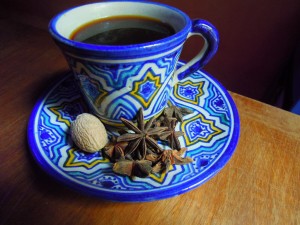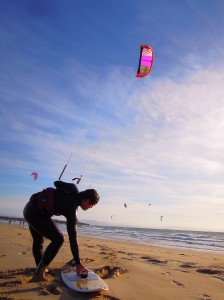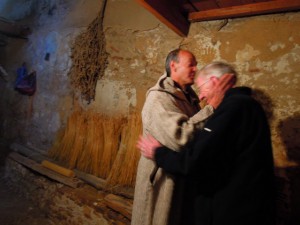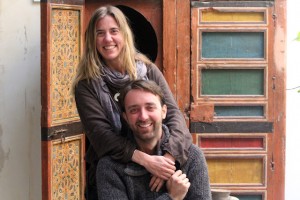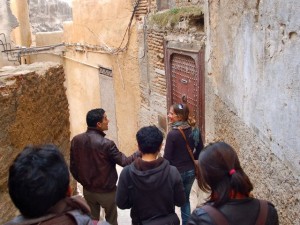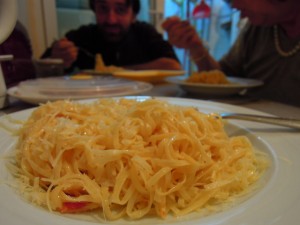 Lilly appraised me the first morning over coffee. I was holding a book. “I’m relieved to see that you read,” she said. I had already struck down one of her stereotypes: Americans are dumb, and don’t read
Lilly appraised me the first morning over coffee. I was holding a book. “I’m relieved to see that you read,” she said. I had already struck down one of her stereotypes: Americans are dumb, and don’t read
Meeting your partner’s Italian mother is intimidating enough—and Lilly wasn’t particularly fond of Americans. “I will never set foot in your country,” she declared. When she was young, she loved America. But the political events of the past decade have left her feeling spurned. I love Italians, but am easily undone by their sometimes-blunt declarations.
Fitting into Andy’s Italian family wasn’t going to be easy. Even if I learned to speak the language, certain subtleties would always elude me: the micro-mannerisms and nuanced intonations, the place-marinated references and provincial worldviews. Mixing disparate families is like grafting a cabernet rootstock onto a merlot; all you can do is plant it in the soil, and hope it’ll take.
Despite our differences, by late afternoon Lilly and I had found common ground: We both loved to cook. Soon we were making dinner.
“I can teach you how to make tagliatelle.” Lilly said in her rich Italian accent. “BUT,” she qualified sternly, “you’ll need 20 to 30 years to get it right,” She rapped an egg on the edge of the bowl and let the yoke drool onto the flour. I watched carefully and wondered:
How could a recipe with only two ingredients take 30 years to learn?
She forked the egg into the flour with one hand and twirled the bowl with the other. Her short, quick strokes were like her personality: effective, fiery, sure.
“Actually, you will never get it right,” she said, changing her mind as quickly as the mixture turned to paste. She added more flour. “You must be born in Bologna to get it right. Even I was born too far south. In Puglia.”
Tagliatelle comes from the town of Bologna. The Chamber of Commerce has a glass display case which features a strand of tagliatelle rendered of solid gold, and cut to the official dimensions: one millimeter by six millimeters.
Not only must it be cut to spec, but it must be made with a specific kind of flour. In Italy, flour is classified as either 1, 0, or 00, depending on its texture. Tagliatelle should be made with Doppio zero flour, which is the finest grind and talcum powder soft.
These details seemed over-particular to me—until I remembered my favorite bread back home in Talent, Oregon. New Sammy’s Cowboy Bread consists of three ingredients—flour, water, and salt—and is kneaded and baked in the simple kitchen of a small local café. For 15 years, I toasted this bread for breakfast. But one morning, a few years back, it tasted slightly different—slightly denser, somehow chewier. The next loaf I bought was the same. With just three ingredients, what could have gone wrong?
I mentioned this to the baker. He told me they had recently remodeled the café, and were now making the bread in a different room—one with a slightly higher humidity.
“Different room, different bread,” he explained.
But back to the tagliatelle. Lilly was upset now. She punched more flour into the dough, then kneaded it again. She dumped it onto the table. “It’s too damp,” she sighed. Normally, the dough would be rolled it into a perfectly formed circle, called a sfoglia, on a wooden board with a wooden rolling pin made of a specific kind of wood. “And when it is ready, you’d blow underneath,” she bent down and mimicked the test, “and it would float up like a silk bedsheet.”
Instead, she produced a pasta-making machine. She affixed it to the counter and tightened the vice on the hand crank machine and began to run the dough through it. It went in as shapeless lumps and came out in smooth sheets. With each pass it became softer, thinner, more diaphanous. “It’s a bit too smooth,” she lamented. “Better if it’s a bit rougher. You have to have a Bolognese grandmother to do it right. I didn’t.”
“Alora, we need to dry the dough a bit.” Lilly opened the doors of a low cabinet by the window, and balanced a mop across them. One by one she draped the sheets of dough on the mop handle. They hung in front of the breezy window like luminous animal hides.
“Alora: You have to keep watch,” she instructed, folding the last one across the wooden handle. “They can’t get too dry.”
Our next step was to cut the pasta sheets into the stipulated 6mm strips.
When dinnertime arrived, we were instructed to be poised and ready in front of our plates. “Tagliatelle must be eaten straight out of the water,” she said, adding a bit of prosciutto and a dab of butter.
It was a meal of simple genius. Missing were the charades of spice that would have disguised a less careful cook. In a meal of so few ingredients, the critical variable is the maker’s hand. Beyond the mechanics of egg, flour and fork were the additions that couldn’t be measured in cups or tablespoons: the childhood imprints of watching Mom and Mom’s Mom at work, and of developing “the feel” for when it is not too wet or too dry, too smooth or too rough, too wide or too narrow. A feel for when it is just right.
“It’s really great,” I said.
Lilly looked at me askance. What did my American taste buds know? For after the first few bites, her brow furrowed. She had detected a problem. “I’m not quite from Bologna,” she shrugged.

